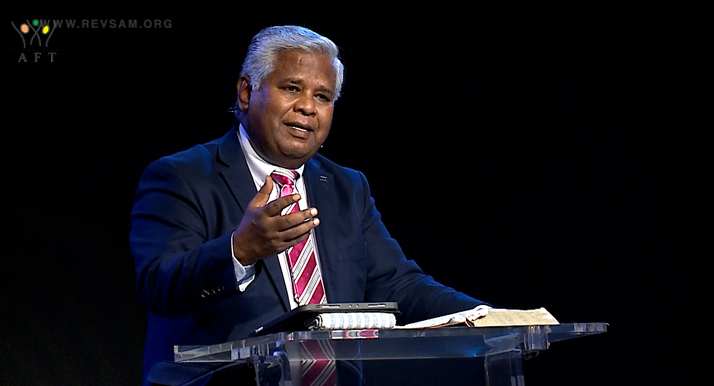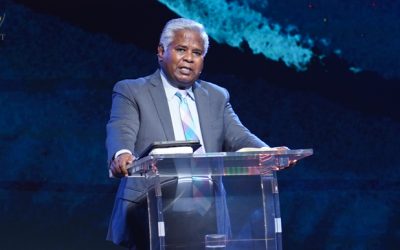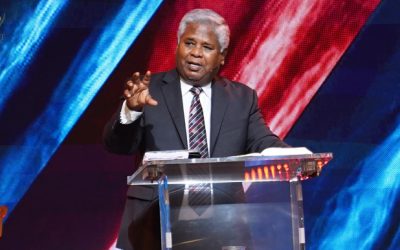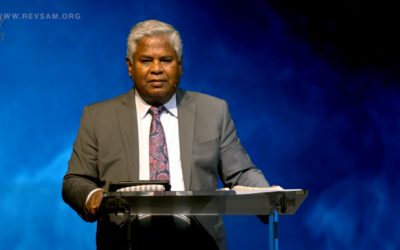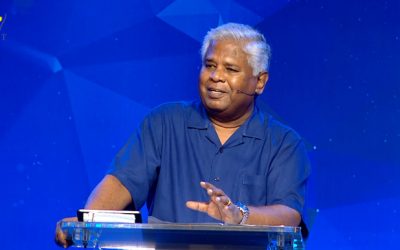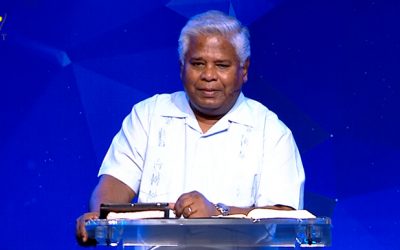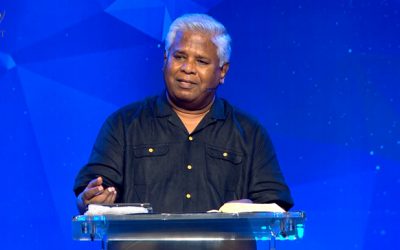
How Grace Changes Us? (Part 7): Peace
Sunday English Service – 09 JAN 22
Transcript
Please turn with me to Colossians, chapter 3. As you know, we’ve been teaching on “Abounding Grace”. In this teaching, we came to 1 Corinthians 13, if you remember. And in 1 Corinthians 13, there is a real turning point, a great principle that Paul gives there, in verse 3. He says, “And though I bestow all my goods to feed the poor, and though I give my body to be burned, but have not love, it profits me nothing.”
The principle that is established here is this; it’s an amazing principle. He means to say that it is possible for a man who has never had a supernatural change of heart, has never had the work of God’s grace in his heart, no change in his heart by the work of God. But yet, even that man is able to bestow all his goods to feed the poor and he’s even able to give his body to be burned but he’s not motivated by love. It’s not because his heart has been changed, it’s because of so many other things. And I shared with you some of the reasons. For some people, they’ve been taught that that God will punish them if they don’t do this; that they have so much and they must give and so on. And for some, they’re guilty, and therefore, to appease their guilty conscience, they will do it. There are others who have been taught that this is the way they must do and this will give them a good name, give them a reputation as a giver, and so on. So, there are various motivations. We’re not even going into all the motivations but there are motivations that does not come from a changed heart. It comes from other sources, such as these that I’ve just mentioned. So, it’s possible for a man who’s never had a change of heart, a work of God done in his heart, to bestow all his goods to feed the poor and to even give his body to be burned. It’s an amazing thing. It’s possible for a man to do it even without a change of heart, by the Holy Spirit.
Now, after mentioning that, in verse 4 onwards, up to verse 7, Paul mentions what a changed heart behaves like. He says, “Love suffers long and is kind; love does not envy; love does not parade itself, is not puffed up; does not behave rudely, does not seek its own, is not provoked, thinks no evil; does not rejoice in iniquity, but rejoices in the truth; bears all things, believes all things, hopes all things, endures all things.” Then finally, in verse 8 it says, “Love never fails.”
So, after giving us the great principle in verse 3, that a person without having a change of heart by the Holy Spirit, can still do some amazing, good works. He talks about what a person with a changed heart does, the characteristics and qualities of a person who has gone through a supernatural change of heart. So, we talked about a couple of those characteristics from 1 Corinthians 13. We talked about the very first item, “longsuffering”, then we talked about “kindness”, the second one and today I want to talk about “peace”. Now, “peace” is mentioned in Galatians, chapter 5, verse 22. You know, because these qualities of a changed heart are mentioned in so many places, the list is given in many places in the New Testament. Galatians 5:22 and 23 is one such place, where it talks about the fruit of the Spirit. It says, “But the fruit of the Spirit is love, joy peace, longsuffering, kindness, goodness, faithfulness, gentleness, self-control.” So, there it is: “peace”, as mentioned here. So, we’re going to talk about peace.
Now, I want to talk about it in two ways. First of all, we want to talk about what the supernatural peace is, what it is all about. And then, I want to talk about how we cultivate it and I want to spend a little more time on how we cultivate it because the cultivation of this trait or this characteristic involves certain things and then, applies not only to the matter of cultivation of this peace, but also to the cultivation of all of the qualities and characteristics that belong to the heart that has been changed supernaturally by the work of the Holy Spirit. So, let’s talk about it.
What is this supernatural peace? What is it all about? Let me read you Colossians, chapter 3. The first 15 verses, I want to really give an exposition on the 15 verses. So, let me read it once, so you can get the idea of what it’s talking about. Here is a great list once again, of what a supernaturally changed heart does. If then you were risen with Christ, seek those things which are above, where Christ is, sitting at the right hand of God. Set your mind on things above, not on things on the earth. For you died, and your life is hidden with Christ in God. When Christ who is our life appears, then you also will appear with Him in glory.
Therefore, put to death your members which are on the earth: fornication, uncleanness, passion, evil desire, and covetousness, which is idolatry. Because of these things the wrath of God is coming upon the sons of disobedience, in which you yourselves once walked when you lived in them.
But now you yourselves are to put off all these: anger, wrath, malice, blasphemy, filthy language out of your mouth. Do not lie to one another, since you have put off the old man with his deeds and have put on the new man who is renewed in knowledge according to the image of Him who created him, where there is neither Greek nor Jew, circumcised nor uncircumcised, barbarian, Scythian, slave nor free, but Christ is all and in all.
Therefore, as the elect of God, holy and beloved, put on tender mercies, kindness, humility, meekness, longsuffering; —see, the list is there— bearing with one another, and forgiving one another, if anyone has a complaint against another; even as Christ forgave you, so you also must do. But above all these things put on love, which is the bond of perfection. And let the peace of God rule in your hearts. I want to stop right there.
It comes at the very end of all this sweeping chapter on a changed heart. You see a big list is given of what a changed heart is like. And then, in the end of the it says, “Let the peace of Christ rule in your hearts.” There is another passage that is kind of parallel to this, in Philippians, chapter 4, verse 7, it puts it like this. This is also about peace. Chapter 4, verse 7, says, “And the peace of God, which surpasses all understanding, will guard your hearts and minds through Christ Jesus.” Look at that: “The peace of God, which surpasses all understanding, will guard your hearts and minds through Christ Jesus.” And then, interestingly, in verse 11, and 12, he puts forth again an amazing principle. The Bible is full of principles like this. Look at what he says, “Not that I speak in regard to need, for I have learned in whatever state I am, to be content: I know how to be abased, and I know how to abound. Everywhere and in all things, I have learned both to be full and to be hungry, both to abound and to suffer need.” Now, what is he talking about? Why is he saying this, that he has learned the secret of being content in any and every situation, whether well-fed or hungry, whether living in plenty or in want? Why is he saying that? The principle is this! He says, “No matter what my circumstances are or situation is, it doesn’t matter. That doesn’t dictate whether I have peace or not. My peace comes from God. My peace is a peace that passeth all understanding and just because situations and circumstances are difficult, it doesn’t rob me of my peace. This is not a peace that can be robbed”, he says. So, what he’s saying is that the peace that he has or happiness that he has, is not a matter of circumstances. It is a matter of the heart because the heart is a good heart. It is a heart that is established in God and God’s word. Because it is a good heart, therefore, the circumstances cannot make a difference. Peace cannot be lost.
See, some of us think that circumstances are the cause for the loss of peace in our lives. We think because such and such circumstance came and it is because of the circumstance, we think we lost our peace. But the Bible does not say so. The Bible reveals a very important principle. It says that you cannot lose peace because of circumstances. Circumstances. may trigger it, trigger the loss of peace or better to say this way: circumstances may reveal the condition of your heart. Peace is lost not because of circumstances; peace is lost because of the condition of the heart. The circumstances sometimes bring out that condition of the heart The heart is a bad heart. The heart is not established in God. The heart is not trusting in God. The heart is not built up with a word of God and such a heart, when it faces difficult circumstances, then circumstances really bring out what is in the heart. Heart is already bad; heart already does not have this peace that comes from God and the circumstances simply ends up revealing what is the heart. So, peace is a matter of the heart; it’s not a matter of circumstances. When we experience lack of peace, it’s usually because it’s triggered by some change in circumstances. It’s not lost just because of circumstances; circumstances simply bring out what is in the heart. Circumstances cannot be the cause for the loss of peace. Alright.
Now, what do you learn from these statements? We saw two statements. One is Colossians, chapter 3, and verse 15, which says, “Let the peace of God rule in your hearts.” And Philippians 4:7 says, “The peace of God which surpasses all understanding will guard your hearts and minds through Christ Jesus.” Let me talk about what this peace is all about. First of all, this peace is a living power. It is not a feeling. It’s not a general condition but it is a living power that comes into our life. If you look at the verbs that are used here, particularly see in Philippians, chapter 4, as well as in Colossians 3, we’ll go to that later. Philippians chapter 4, verse 7, it says, “Let the peace of God guard your heart”, it says. “Guard your heart.” So, peace of God does something. The word, “guard” has this kind of meaning. You see, it’s like the soldiers going around the walls of the fortification, the fort of your heart. Like a guard, warding off any attack of fear, worry, anxiety and all of those things. The peace of God really guards you from all the attacks of the worry and fear and anxiety and all of those things. It’s like a soldier marching around the walls of the fortification, guarding your heart. When it says that the peace of God guards your heart, it envisions the peace of God like a soldier going around with his weapon, stopping every attack, protecting the heart, so that anxiety, worry and fear does not enter in. So, “guarding” means exactly that.
Now, the peace that the Bible talks about is not a vague inner condition. It’s not a feeling because some people imagine peace as a feeling. They say, “Well, I feel peace”. So, peace is basically a feeling to them. Well, really, the Bible does not teach it like that. The Bible teaches that it’s a power that comes into your life. Peace is a power that comes into your life and acts. It is active, it dominates, it guards you, it protects you. It is an active power that comes and acts in your life.
Secondly, this peace rules. This peace rules, because Colossians chapter 3, verse 14 says, “Let the peace of God rule in your hearts.” Do you know in John’s gospel, chapter 14, and verse 27, Jesus told something to the disciples? He said this: Peace I leave with you, My peace I give to you; not as the world gives do I give to you. Let not your heart be troubled, neither let it be afraid. So, He’s talking about a peace and He says, “It’s not like the peace that the world gives.” So, what is the peace that the world gives? He gives a clue here. Let not your heart be troubled, neither let it be afraid. In other words, the peace that the world gives, gives way to the fear and trouble. It doesn’t stand against the fear and trouble. It’s there but then it’s gone. It’s a peace that is there, seems to me there but it’s taken away as soon as some circumstances become bad. That’s what He’s talking about. He says, “But I give My peace to you, not as the world gives. It’s not the peace that the world gives, because the world gives a peace that goes away during some circumstances. The peace that I give you, it stays. No matter what happens on the outside, it stays.” For example, think of a mirror. Now, the mirror itself has no power of illumination on its own. If there is light outside the mirror, it’s illuminating, but if it’s dark outside the mirror is dark. The mirror does not show anything. It has to have light outside in order for the mirror to show what is there. It has no power within it, of illumination. The natural heart is like that mirror. It can only reflect its circumstances. The natural heart can only reflect its circumstances. Just like when you look into a mirror, it can only show you what you look like. It cannot show you any better than what you actually look like. It just simply reflects what you are. So, the natural heart is like the mirror. It can only reflect the circumstances. If there are peaceful circumstances out there, you have peace in the heart. But you don’t have peace on your own. You don’t have your own peace. Just like the mirror doesn’t have its own illumination. Without the light, it cannot show anything. It can only show what is there. When the light is there, it can only reflect what is there. The mirror itself does not have something of its own. The peace that the world gives you could be taken away so fast. So, we’re talking about here, the peace of Christ, the peace of Christ that rules. It’s not ruled by circumstances; it rules in spite in spite of circumstances. It rules from the inside. In rules from itself. It’s your peace. It’s not a peace which the world gives you and then, it’s taken away. It’s in you. It rules, it dominates, it wards off, it works in spite of the circumstances. That’s the thing about this peace.
And thirdly, this peace is the peace of Christ. This peace is a living power. This peace is something that rules. This peace is the peace of Christ. It says that the peace of God—it’s talking about. So, it’s the peace of God, you may want to say. It’s not the peace that you develop yourself. It’s a peace that comes from union with Him, as a result of your relationship with Him. Therefore, for this peace, you’re completely dependent on Him. You have no peace of your own, unless you have this supernatural peace, It is given to you. Do you have this peace? So, this is the supernatural peace that the Bible talks about. It’s an active power. It is a living power that comes and dominates, acts, guards. It’s a power that comes and rules. And it is called the peace of God. It comes from God, that’s why it’s called, “the peace of God”. You don’t generate it yourself. It’s from God.
Now, secondly, how do we cultivate this supernatural peace? Now, this is where we want to spend a lot of time. There are three disciplines that we are going to look at in cultivating this peace. This is so important and this is so practical. Three strategies. The first one is we need to think some things out – think some things out. Now, what do I mean by, “think something out”? In Colossians, chapter 3, verse 1, look at the way it puts it. Paul puts it this way: “If then you were raised with Christ”— that’s the way he puts it— If then you were raised with Christ, seek those things which are above, where Christ is, sitting at the right hand of God. Now, the very tone and the very way he puts it, tells us that the Christian approach to peace demands logical thinking. “Think logically”, it says. How different this is from the approach to peace that the world has. The world, when it approaches peace, they deal with it like this. They say, “Oh, you don’t have peace. Your heart is troubled. You’ve lost your happiness. You’re all tensed up. Your situation is bad. It has really unsettled you. Come, we’ll teach you some technique. We’ll teach you some breathing techniques. We’ll teach you some relaxation techniques, meditation techniques, this and that technique.” They go straight away into techniques of how to relieve yourself from this tension and from this peacelessness and so on. But this is not such a simple matter. This is not such a superficial thing, to be dealt with in a superficial manner. It’s not just a matter of breathing in a certain way and doing some exercises and some things like this or using some techniques like that. That will not solve it because it is a deeper problem. It has to do with who you are, how you are made, who made you, for what you are made, where you came from, why you are here, what kind of life you’re supposed to live. Who’s the God that made you, why He made you the way you are? Why you’re made in the image and likeness of God. Why you’re supposed to live in a relationship with God, what happened to that relationship, why are you lost, what has gone wrong, why have you lost your peace? See, that’s where it comes. You’ve got to go into all of those questions, deep questions, asking about where you came from, for what, what life is all about. What is the meaning of life? Who created you, why He created you, why you were created this way in the image and likeness of God? How you’re supposed to live and why you’re not the way you’re supposed to be? What has gone wrong? Only when you answer these things, can you understand why peace is lost. Then only you can bring back peace because you really understand what has gone wrong and what has robbed you of your peace. But we never go into those deep questions. They say, superficially, in the world has a way of dealing with this question of peace. They just deal with it as a relaxation technique, meditation technique. At best, they’ll go ahead and deal with some controlling, guilty thoughts and so on. They get right to the technique. They don’t start with thinking. They start with doing some things. They do not think deeply, they do not think about real issues.
Plus, there’s something seriously wrong with their thinking also. They think the world is an accident and human life is an accident and because they think everything is an accident, this has implications. Then, that would mean then, there is no reasoning. There is no empirical, rational reason. There is no reasonable basis to say that a human being is more valuable than a rock; he’s just like a stone or a rock. Therefore, there is no right and wrong, so they deny any such thing as the knowledge of right and wrong and all those things. They say, “No, there is no right or wrong. Nobody can tell me what is right or wrong. Who is anybody to tell me what’s right and wrong? Why should I believe the Bible? Why should I believe these teachings? I will do whatever I want. I can do whatever it is in my power”, and so on. They don’t believe in right and wrong, but they’re a bundle of confusion, you see. They’ll say, they don’t believe in this teaching about right and wrong and all of that. They don’t believe somebody created them. They don’t believe that they are moral creatures. They don’t believe there is a purpose behind creation, that they are created beings. They don’t believe all these things. Yet, when you hear them talk about and you’ll hear them talk about it. Have you seen that? They’ll talk about how injustice is wrong. They will talk about violence is wrong. They’ll talk about this is not right. That is not right. This is indecent. This is bad. This is evil. What are they talking about? You see, they’re confused in their mind.
On the one hand, they say they don’t believe that they were created, they don’t believe there is a purpose there, they don’t believe that. Therefore, reasoning can be applied to this. We’re just as good as a stone. And at the same time, they apply all kinds of moral requirements on this human life. Where does all that come from? But Christianity teaches in the exact opposite direction. Paul says that this world was created by God. It was created by God, for man and man was created by God, for God, for friendship with God. That is why He created him in a particular way, in His image and in His likeness. Just like God, he was created. And he was supposed to live in a relationship with God and fellowship with God. And somehow, he got away from that and turned away from God. And God wants to bring this man back to Himself. Therefore, God is moving Heaven and Earth at an infinite cost to Himself. And He has come down in the form of His Son to get us back. He sent His Son, had Him die on the Cross, atone for our sins, so that the sin that was standing between God and man can be removed. So, God and man can be united. All of this God does, to bring this man back to Himself, His creation back to Himself, this person creation that He has made for Himself. This is what the Bible teaches and if you don’t have peace, if you don’t have peace and happiness, it’s because you’re not thinking out these things. You’re not going deep into these things and thinking these things. If you don’t have peace, it is because you’re not thinking about Who made you, why you were made, why you were made this way, that there is a God and what this God has done to reach out to you and bring you back to Himself. You don’t take all of these things into account. That is why there is no peace. It is because you’ve lost contact with God. You’ve rejected God because you’ve rebelled against God. Because your heart is turned away from God, that this way there is no peace. The cause for peace is found when you deal with these questions of origin. Questions of where we came from, why we were made, why we were made this way, what happened, what went wrong and what God has done to set things right, why Jesus came. Who is Jesus? Why did He die? Why did He rise again? What has He done? What does it mean to us? All of these things are behind this question of, “where is my peace; why have I lost my peace; how can I find my peace? Without going into these questions, you cannot come to it.
So, you can see how techniques don’t solve this problem. The world’s methods don’t solve this problem at all. So, there’s a big difference between the world’s approach and the biblical approach to peace. The world’s approach says, “Just use the technique.” The biblical approach says, “Go back to where He came from, what for, what purpose, what is the meaning of life and so on?” You see, Christianity says, “You want peace? There are no intellectual shortcuts.” I say this because there are people who say, “Well, brother, I don’t want to hear about where I came from, for what God made me, why He made me like this, who God is, who I am. I don’t want to hear about all this. I don’t want to hear about why Jesus came, why He died, why He rose again, what He did, or I don’t want to hear about what’s wrong with man. I don’t want to hear about sin. I don’t want to hear about why the Bible is true. I don’t want to hear about the Cross, the resurrection. I don’t want to hear about all that. What I want is, when I come into a Christian Church like yours, you sing beautiful songs, and wow, this is so nice. The music is so nice. And when I come there, I feel a presence. And I feel like peace is coming to me. I feel in all peace all over. I feel like I’m drenched in peace and I feel so good. And that’s all I want. I don’t want to go into all these things. I don’t want to think these things. I don’t want to get intellectual about it.” See, they think, like some people say, “Well, I always thought Christianity was simply close your eyes and just believe and peace will just fill your heart you know?”
Well, it’s not like that. Christianity is about thinking. There’s reason behind it. Christianity is an amazing, marvellous story of mankind. Where we all came from, why we were made, what we are made for, what has gone wrong. And what is God’s solution for what has gone wrong? It’s a marvellous, tremendous story, and we are part of that story. That’s what Christianity is all about. And without coming and thinking about it, there cannot be peace. If you say, “I just want to come and feel the peace.” Well, that’s not what Christianity is. That is why, in the Christian Church, in a proper Christian Church, we come with our Bible. We open our Bible and we preach and teach and surely, we preach in-depth. We go into certain things; we explain certain things. And as we explain certain things and show you certain things, there you discover where the foundations of peace lay, there you get a hold of peace, there peace comes, there peace is cultivated, there peace begins to multiply in your heart. As you learn, as you come into an understanding of all these things.
Secondly, just knowing and thinking about these things is not enough. There’s something that you’ve got to do. You’ve got to dig down deep and get rid of certain things. Look at Colossians, chapter 3 and look at verse 5. It says, “Therefore put to death your members which are on the earth.” One translation says, “Therefore, put to death whatever belongs to your earthly nature, such as sexual immorality, impurity, lust, evil desires, greed, which is idolatry.” Now, therefore put to death. One translation says, “Therefore, kill off, kill these things. Finish these things. Get rid of these things”, he says, Put to death. literally kill these things. And there’s a long list of what you need to kill. In verse 5, it’s talking about sexual obsession, impurity, your materialism, greed, all of that. In verse 8, it talks about anger, rage, malice, and slander. In verse 9, it talks about lying, dishonesty, lack of integrity, and so on. In verse 11, it talks about—there are other problems there, it looks like—amazing.
There was class and race strife within the Church because it says, “There is no Greek or Jew, circumcised or uncircumcised, barbarian, Scythian, slave or free”, and so on – “but Christ is all and in all”. In other words, there has been class distinctions and class strife within the Church. Well, even now, I hear a lot about people talking about why class distinctions are in the Church. They say, “Well, Christians of class distinctions; they have caste distinctions,” and so on. Well, yes, it’s there because people came from the world. They come from a world which has taught them these things. Christianity never taught them these things; the world taught them and developed these things, and they’re part of that world. And they came from that world into faith in Christ. So, when they come to Church, they come with all that excess baggage, with class distinctions, race distinctions. One man looking at another man as something lower than himself, and so on. These attitudes, they come with all of that excess baggage. But Christianity never taught these things, neither does Christianity promote these things. That’s the thing about Christianity.
Take for example, slavery. Slavery existed in the ancient world, everywhere. People are buying and selling men and women as slaves. People were taken as slaves, kept as slaves. So, a free man looked at the slave man as a nothing, like dirt. When Christianity came along, when the Churches were begun, and people put their faith and came into the Church, there were slaves also that put their faith and came into the Church. So, the Church had both slave and free, in the Church. Just imagine! The ‘free’, probably had the same attitude that he had before, you know. Look who I am; you are just a slave. That kind of a thing. They had all these distinctions going, but when they came to the Church, the Church never promoted it, never said that is right. It always spoke against it; it always spoke about getting rid of it. That’s why it says here, “There is neither Greek nor Jews, circumcised or uncircumcised, barbarian, Scythian, slave nor free, but Christ is all in all.” That’s Christian teaching. When they come into the Church, they hear that these distinctions do not belong to the people of God. Christ is all in all. We’ve have come and become one.
When you make a cake, you bring sugar, you bring flavour, you bring various things together, to make a cake. You may bring flour, you bring sugar, you bring flavour and whatnot. You bring all kinds of things. So many ingredients are needed. And you bring them and you put them together and make a cake. Once the cake is made—egg is there, a lot of other things are there—once the cake is made, are you able to taste the egg, separately? No! It is all merged and mixed with the cake. The egg cannot have a separate identity, salt cannot have a separate identity, sugar cannot have a separate identity. All their identities are merged together; they become one. You cannot tell one from the other. You get it all together. It’s all one. They lose their identity. It is a beautiful thing that happens in Christianity. That you come from all kinds of backgrounds. Yes, you come with all that excess baggage of race, language, and caste and all these distinctions. But when you come into the Church, the Church teaches and you begin to realize that you’re one body, the body of Christ. See, that is why, in the ancient days when there was slavery and free men and so on, when they came into the Church, Church dealt with it. It was the Christians who got rid of slavery.
Some people I hear, say, “Well, Christians, you know, they had slaves also in their Church. What about that?” Yeah, they had, but they were working all the time to get rid of that. They were teaching all the time to get rid of that. They didn’t believe that it was the right thing. The society has already built that into the system. People come from the society. What can you do? And Christianity takes them and makes them one. Christianity is a marvel; the Church is a marvel. It’s a wonder! In the New Testament times, people just were astonished at looking at them because the Jews and Gentiles are so distinctly different, they will never come together. They will not even have a glass of water from one another. That’s the way they were. They will not mix at all. But when the Christian Church opened up, there were Jews and Gentiles. Jews and all other races coming together, sitting, worshiping together, being brothers and sisters, eating together, really coming together in that way. They became one body – that was a beautiful thing. So, Paul says, “Get rid of all of this. All of this is the problem. But in the middle of all of this, there is one key problem”, he says, in verse 5. There is one word that is used in verse 5. It says, “Put to death your members which are on earth: fornication, uncleanness, passion, evil desire…” Evil desires. The translation has it here as, “evil desires”; the older translations, King James, I think has it as, “evil concupiscence”.
Now, Paul uses this word, in the Greek language, it’s “epithumia”. Paul uses it, Peter uses it, James uses it. Almost everybody uses it when they talk about the works of the flesh, and so on, of a changed heart, and so on. Evil desires. For want of a better translation, they just translated it as, “evil desires”, but it’s not an adequate translation. Evil desire gives the meaning of “epithumia” as a wrong desire. A wrong desire, which is not right. It is not about a wrong desire that it’s talking about. It’s talking about an over-desire, a mega desire, a desire that is there in a size that it should not be there. A desire that has gone out of bounds; a desire that has become uncontrolled; a desire that has crossed its boundary and limits, it should not be there. Therefore, since it has gone beyond its boundary, since it’s gone overboard, it’s become an over-desire, it’s become an evil desire. It’s about a good desire becoming an evil desire. So, a good thing overdone, can become evil. That’s the case here. That is what it’s talking about. Epithumia is about it.
So, it’s mentioning a lot of things here. Look at what it says. It talks about sexual obsession, impurity, materialism, and greed, and all of those things. In the New King James version, it says, “Therefore put to death your members which are on the earth: fornication, uncleanness, passion, evil desire, and covetousness, which is idolatry.” Now, look at that, because it says, “Consciousness, which is idolatry”, people only look at that and they say, therefore, that consciousness is idolatry. But the Bible is not saying consciousness only is idolatry; everything else, along with it is also idolatry. Everything mentioned there is also idolatry. A similar list is found in Ephesians, chapter 5, in verse 5. Actually, in verse 3: But fornication and all uncleanness or covetousness, let it not even be named among you, as is fitting for saints; neither filthiness, nor foolish talking, nor coarse jesting, which are not fitting, but rather giving of thanks. For this you know—now, listen to this— that no fornicator, unclean person, nor covetous man, who is an idolater, has any inheritance in the kingdom of Christ… Now, even in this place, as well as in Colossians, 3, verse 5, it is not saying that consciousness is idolatry. It is saying everything else, fornication, uncleanness, everything is idolatry.
How does Bible teach idolatry? If you go to Exodus chapter 20, where the 10 Commandments were given. Do you remember that, where the 10 Commandments were originally given by God? Look at how God gives it. He says, “I am the Lord your God.” Exodus, chapter 20, verse 2: I am the Lord your God who brought you out of the land of Egypt, out of the house of bondage. So, God says, “I’m God. You shall have no other gods before Me.” Look at this. He says, “I am God; don’t have any other gods.” You have only two options: you can have God as your god or have something else as your God. There is no third option of having no gods. Are you listening to me? No third option of saying I have no gods. Everybody has a god. Everybody has something for a god. They either have God the Lord, as their god, or they have something else as their god! There is no person, really, in reality, technically, they may say, “I’m an atheist; I don’t have no god.” But in reality, everybody has a god because everybody worships something. Everybody considers something as god in their lives. Everybody considers something as god in their life. That is how the Bible teaches idolatry. Idolatry is not just about worshiping a statue somewhere. It is a larger issue. It is about placing anything, anything and everything that comes and takes the place of the living TRUE GOD, is idolatry. If you’re not worshiping the real true and living God and worshiping anything else, anything else, like it says, it can be like in Colossians, chapter 3, verse 5. Covetousness, it’s talking about. Money, for example. Money is not a bad thing; it’s a good thing. It can be used for good. Money gets you your food, money pays your rent, money pays your bus fare, money pays for your petrol, money pays for your children’s education, money clothes you, money keeps you from shame and insults in this world. You don’t have to go, stretch out your hand and beg from anybody. So, don’t believe these people that say money is bad. No. “The love of money”, the Bible says, “is the root of all evil”, not money. Money can do a lot of good for you. It can give you a lot of good things. You can do a lot of good things with it. You can donate it, you can help the poor, you can do a lot of good things with it. You can help yourself with it, feed yourself, clothe yourself, educate your family, do good things for your family, you do a lot of good things with it. It’s not bad. But you take this good thing and put it in the place you ought not to put it, like you put it in the place of God and you begin to worship it and you begin to think that that’s the greatest thing in your life. That this when it becomes evil. That is when it becomes evil.
Everybody has a god. You can run this test on yourself. We all run this test on ourselves. Is there anything in your life that you consider as so great and so important? That you feel like if you lost it today, if it goes out of your hand, if you lose it, you have no more life that you would rather die. Do you feel like that about anything? About your husband, your wife, your children, your assets of any kind, your property, your house, your whatever you have, your job or career whatever? If you feel like if you lost it, you have no other life and that you rather die. If you feel like that, then that is your god. Whatever you think is so important, that is your god. Whatever you spend your time on, whatever you spend your time mostly on, whatever you spend your efforts on, whatever you pay most attention to, whatever you desire most, whatever you love most, whatever your heart got goes after most, whatever you strive after most, that is your god. Whatever you think is the greatest thing in your life, without which you have no life that you would rather die, that is your god. Do you have anything like that? That is what the Bible calls, “idolatry”.
So, idolatry could be a number of things. You should not look at just covetousness either, as idolatry. It could be anything; anything can be idolatry. That’s the way the Bible teaches it. You can run this test on yourself. Do you have anything like that in your life? Do you have anything that you consider to be so important, that, without that, you don’t have any life? That means you’re saying that thing is your life. Your wife is your life, your husband is your life, your children are your life, your job is your life, your career is your life, money is your life, whatever. Whatever you think is your life. This is my life, without this, I have no life. That is what your god is.
Now, you’ve got to, really, when you want to have peace, you’ve got to identify what that god is, what you’ve got in your life as god. What is your Lord, what is your Saviour? What is your salvation? What do you think as your redemption? What do you think is the greatest thing? You need identify. You cannot get peace without that. You need to identify if it’s the wrong thing. If it is anything other than Jesus, you need to get rid of it, in order to have true peace. Peace is not a matter of just a relaxation exercise. It is not just a matter of a breathing exercise. It is not just going through some kind of exercise, outwardly, superficially in order to relieve you of tension. Peace is a deep thing. It has roots in these things. Unless you address these things, you cannot have true peace. And when you have peace in this way, your peace, nobody can take it away. No situation, no circumstance can rob you of this peace. So, you need to do the first thing that is think it out. Think where you came from. What for you’re here, who you are, who your god is, what has gone wrong? You need to think these things. If you then be risen with Christ, seek those things which are above, where Christ is, sitting at the right hand of God. If you then be risen with Christ, that sets you on logical thinking. Think it out. Secondly, dig it out. Dig out these things that needs to be dug out and thrown out of your lives, the wrong things that are occupying the place of God in your life. And thirdly, we need to lift up our heads and look up and consider something very important.
There was a man named Thomas Chalmers. He said this, “Idols cannot be uprooted; they can only be replaced.” How do you get rid of these wrong gods that we have set up in our lives, that are things that have become gods? Knowingly or unknowingly, we have allowed them to become gods. How do we get rid of those things? How do we take our desires and affections from those things and set our affection on God, on the things of God, on the things above because that’s our deliverance? That’s our way to peace. That’s the way peace can multiply in our lives. How do we do it? Thomas Chalmers says, “Idols cannot be uprooted; they have to be replaced.” You can take this out and put something else, so that you can pour all that desire that you’ve been pouring upon this one, on the other One, which is better. You must understand that it’s better, so that you demote this one and bring that One to that place. That’s the way you can have peace. He says, “We only cease to be the slave of one appetite because another taste has brought it into subordination.” You only cease to be slave of own appetite. That is, you only cease, stop being hungry for one thing because you found another taste that has demoted this One, that has brought this down and this has lost its importance. The other one has taken its place. Only that way, you can replace these idols, he says. The only way to dispose an old affection is by the expulsive power of a new one. How do you get rid of an old affection? Some people have said their affection on things of the earth. How do you take your affection from the things upon which you ought not to have put your affection upon? And how do you set your affections on things above? By the expulsive power of this new affection.
Now, just think about this. You cannot do it by just sheer willpower. You cannot do it. It is not a matter to be done with willpower. How is it done? Look at verse 1-4. Verse 5 says, “Therefore put to death”, right? That’s how it starts, verse 5. The “therefore” references to the first four verses. What do the first four verses say? If then you were raised with Christ, seek those things which are above, where Christ is, sitting at the right hand of God. Set your mind on things above, not on things on the earth. For you died, and your life is hidden with Christ in God. Now listen to this. “Therefore”, points you back to verses 1 to 4 and what that therefore means is this. It says, “You died, and your life is hidden with Christ in God. You were raised with Christ. You not only died but you raised, you’re raised with Christ”. What does it mean? “You died”, means that God considers your sins as forgiven, as if you had died on the Cross to pay for them yourself. He considers your sins absolutely, totally forgiven. When you put your faith in Christ, God looks at you and sees you as a person who has taken on your sin and have been punished for your sins. You died with Christ! You already died for your sins! This soul that sins shall die and you have gone through that debt when you put your faith in Christ. You died with Christ. That’s how Christ looks at you.
Secondly, it says, “You were raised with Christ”. That means, when Christ was raised, He was seated at the right hand of God, in a place of honour and dignity. Everything was placed under His feet. Why? Because God was so pleased with Him and He delighted in Him because here is the Son of God. Philippians 2:5 says, “Let this mind be in you, which was also in Christ Jesus, who thought it not robbery to be equal with God.” Though He was in the form of God, He thought it not robbery to be equal with God. But put aside His glory and humbled Himself even to the point of death. And God was so pleased with it that He humbled himself even to the point of death. So, it says, “Therefore God also has highly exalted Him and given Him the name, which is above every name, that at the name of Jesus every knee should bow, and that every tongue should confess that Jesus Christ is Lord, to the glory of God the Father”. So, God has exalted His Son, being very pleased and having delighted in His obedience, and His perfection. He is so pleased, so delights in Him, He has lifted Him up and put Him at His right hand in the place of honour and dignity and glory. Put everything under His feet. And the Bible says, “You are also raised with Christ”. So, when God delights on His Son, as He sees Him sitting at His right hand, Paul believes that He delights in you and me also, who have put our faith in Christ because when we put our faith in Christ, not only does God see us as having died for our sins, and paying the price for our sins, He also sees us as being raised with Christ. He also sees us as having the same obedience as Christ. He attributes the obedience of Christ, the perfection of Christ to us, the righteousness of Christ to us, and has He delights in Christ, His Son, He delights in us! So, when you think about that, my friend, when you think about that, when you understand that, when you give attention to that, and that looms very big before you, that becomes more important to you than anything else, your affection on other things vanish. Those other things are taken away. Your affection on things above becomes greater.
Look at verse 4: When Christ who is our life appears – I like that. When Christ who is our life appears… Now, what was the problem of idolatry? We took something that is there in our lives and we consider that as the most important thing, that has become our life. That has become our everything. We said, “This is my life. Without this, I have no life. If I don’t have this, I die”. That’s become our god. That has become our life. That ought not to be our life. Christ is our life! I like Paul, when he says, “Christ is our life”. Paul says it, in Philippians, chapter 1. He says, “For me to die is gain. For me to live is Christ”. Literally, he says, “My life is Christ. To die is gain for me. For me to live as Christ”. In other words, he’s saying, “Christ is my life!” Is Christ your life for you? Or you’re saying, this is my life, that is my life. Without this, I have no life. If you think about something as your life and that you have no life without it, then that’s your god. If you think of Christ as your life, then Christ is your Lord and your God. And I tell you, for such a person, peace will rule your heart. Peace will guard your heart, from all anxiety, from all fear, even during these unusual times in which we live. Even in the midst of all the challenges that we face, the peace of God will guard our hearts, rule our hearts and there is no chance of losing your peace because this peace is a peace that God gives. The world that cannot take away, no matter what. And I pray that today, that Jesus will be your life, that if you have, knowingly or unknowingly, put something else as your life, that you will look to God and say, “Lord, I confess that today that it’s wrong. I put it away from my life. You are my life, oh Lord. Jesus, You are my life. I open my heart and I say, “You are my life”. Even if you’ve never put your faith in Christ. You put your faith in Christ today. As you put your faith in Christ, God looks at you and sees you as having been punished for your sins. Your sentencing is over. He sees you as risen with Christ, seated with Him at His right hand. He sees you as having the righteousness of Christ. He delights in you, as He delights on His own Son.
Lift up your hands, open your heart, receive Him, confess Him as your Lord. Take Him on as your Lord and Saviour. Put Him on the throne of your heart, worship Him as your Lord and your God. And I tell you, you will have a peace that passeth all understanding. Nothing in this world, no situation whatsoever, can cause you to lose your peace. You will have a peace that passeth all understanding. Let’s pray.
How Grace Changes Us? (Part 12): Fruit of the Spirit
How Grace Changes Us? (Part...
How Grace Changes Us? (Part 11): Endurance
How Grace Changes Us? (Part...
How Grace Changes Us? (Part 10): Truth
How Grace Changes Us? (Part...
How Grace Changes Us? (Part 9): Pride
How Grace Changes Us? (Part...
How Grace Changes Us? (Part 6): Kindness
How Grace Changes Us? (Part...
How Grace Changes Us? (Part 5): Forgiveness
Abounding Grace (Vol.48) -...
How Grace Changes Us? (Part-4)
Abounding Grace (Vol. 47) -...
How Grace Changes Us? (Part-3)
Abounding Grace (Vol. 46) -...
How Grace Changes Us? (Part-2)
Abounding Grace (Vol. 45) -...
How Grace Changes Us?
Abounding Grace (Vol. 44) -...


